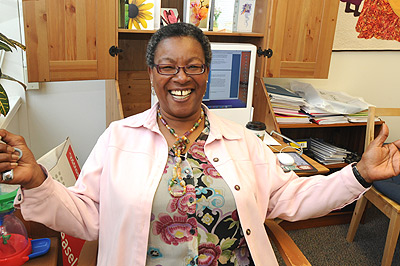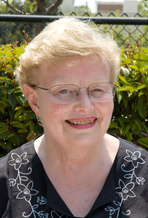Berkeleyan
 |
Carmen McKines (Peg Skorpinski photo) |
A champion of equity and fairness
Ombudsperson Carmen McKines retires after four decades at Berkeley
![]()
| 17 July 2008
For the past 20 years Carmen McKines has served Berkeley in positions requiring an ambassador’s diplomacy, a referee’s fairness, and a psychotherapist’s discretion. A campus figure beloved by many, McKines retired last month as ombuds for students and postdoctoral appointees. At her retirement party on June 26, she received the Berkeley Citation, a fitting capstone to her 40-year UC career.
The campus’s highest honor recognizes the accomplishments of community members “whose contributions are manifestly above and beyond the call of duty.” Harry Le Grande, vice chancellor for student affairs, recalls that as news of McKines’ pending retirement spread, he was approached repeatedly by people who told him she deserved the award.
“The level of loyalty and mentoring to the Berkeley campus that Carmen exhibited over the years could not go unrecognized,” says Le Grande.
McKines served as the campus’s first full-time Title IX compliance officer from 1989 to 2002, and then as staff ombuds before helping to develop and organize Berkeley’s ombuds office for students and postdoctoral appointees in 2003.
From the bottom up
After moving with her husband and three young children to California from Baton Rouge, La., in 1968, McKines landed a job at Berkeley on her first day of job-hunting. “I said to myself, this is where I’m meant to be,” she recalls. She first worked as a senior typist-clerk in the records unit of the chancellor’s office.
Her career trajectory offers a case study in how to advance at Berkeley. “I started my career here at the helm, so to speak,” says McKines. “Even though I was a deckhand, I got to see how the captains of the ship operated.”
Career Center’s MacClelland retires with (a major) honor Like Carmen McKines, Kathy MacClelland has had a remarkably long tenure at Cal. Hers began as a freshman in 1963 and concluded with her retirement last month as associate director of employer relations and recruiting for the Career Center.
At her retirement party, MacClelland received the Chancellor’s Distinguished Service Award (DSA), which recognizes university faculty, staff, and organizations for outstanding service in areas other than teaching or research. During her career, MacClelland has witnessed major changes in the hiring landscape. In her early days, counselors typed job descriptions onto index cards and distributed them to soon-to-be grads. While Web-based job listings have revolutionized human resources, MacClelland points to the increased importance of career fairs in the recruiting process as well. Career fairs, which showcase the talents of students to potential employers, became her focus over the past 10 years. When MacClelland began working at the Career Center, the Berkeley campus hosted one career fair and three graduate/professional school events annually. She helped expand that number to 20, managing a staggering number of details for each one — from securing facilities and parking to coordinating with campus staff, student organizations, and employers. MacClelland spent a decade overseeing career services for students from the College of Letters and Science, particularly liberal-arts majors. “She kept a light shining on these students so they would not become lost among other majors who appeared to be more career-directed,” wrote Jim Sullivan, the Career Center’s associate director, in his letter nominating her for the DSA. MacClelland’s devotion to the campus is not flagging as she heads into retirement. For the short term, she will work part-time to help the Career Center with upcoming career fairs. —W.E. |
McKines eventually worked in nine different campus departments in addition to a five-year stint at the UC Office of the President. With each move, she advanced and also saw how policies and procedures were implemented across campus, and whether or not they were applied fairly and equitably.
In 1989 the campus recognized it could increase its efforts to address sexual discrimination by appointing a full-time compliance officer, and McKines got the nod. Prior to her appointment, the Title IX position was only half-time and rotated every two years among faculty.
One of those faculty members was Donald McQuade, a professor of English who points out that implementing the substance and spirit of the sexual-harassment law was no easy feat at an institution as complex as Berkeley. He calls McKines “a voice of clarity and reasoned conviction” who “set the tone as well as the standard for converting principle into practice, without ever losing her sense of balance and fairness.”
The policy on sexual harassment has helped Berkeley move toward becoming “an environment that’s free from all forms of discrimination, harassment, and hate. That is just core for me as a human being,” McKines says.
She also assisted in laying the foundation for Berkeley’s discrimination-complaint-resolution process, which was designed to address allegations of inequity in areas other than sexual harassment and bias. It’s an accomplishment of which McKines is particularly proud.
Her position in the Campus Climate and Compliance Office prompted McKines to return to school, eventually earning an M.A. in organizational psychology with a concentration in conflict resolution from John F. Kennedy University.
Over the years, McKines helped countless staff and students who felt they were being treated unfairly. She describes her approach: “I am with the person as they are right in front of me. I’m not judging them. I am really hearing what they are communicating, and I’m watching and listening for what they’re not communicating.”
With her ready smile, Southern charm, and hearty laugh, McKines seems to have a natural ability to put people at ease. “Everyone thinks that Carmen is their best friend,” says Cara Stanley, director of the campus’s Student Learning Center. “She just has that kind of personality. She listens so attentively to what you’re sharing with her that you feel heard.”
Her patience and understanding have been taxed when she’s met staff who were unhappy and disenchanted — either with their jobs or their departments — yet refused to take responsibility for their own destiny. “Bless your heart,” says McKines, employing a favorite phrase that sometimes serves as a sly expression of frustration, “why are you in a place that makes you miserable? That doesn’t say much about you in that context, because you have choices.”
Berkeley’s still ‘chipping away’
One of McKines’ guiding principles is “staying focused on being just who I say I am. You gotta walk your talk.”
The campus’s success in walking its talk fluctuates, she says of Berkeley’s efforts to be a diverse institution: “A quarter-century ago, we had roughly 47 African American faculty. I doubt very seriously that we have many more now.” What’s more, “the upper ranks of staff don’t reflect the ethnicity of the state of California, or even the Bay Area, for that matter.”
Sometimes external circumstances have hampered the campus’s progress: “Prop. 209 really did us a disservice. It made certain segments of the California community really feel unwelcome at this institution — particularly African Americans, Latinos, and Native Americans.”
Staff, she says, “just want more opportunity and access.” McKines has seen new job applicants with graduate degrees edge out more experienced staff for campus positions.
“We have to find a way to balance that,” she declares. Doing so, she adds, would enable the campus “to tap into the wealth and richness of experience of the people who work here.”
She likens the campus to Michelangelo sculpting his famous statue of David. “We’re still chipping away and making the masterpiece,” says McKines. “Maybe we’re at his feet and legs. It’s a slow process, but it’s a process.”


